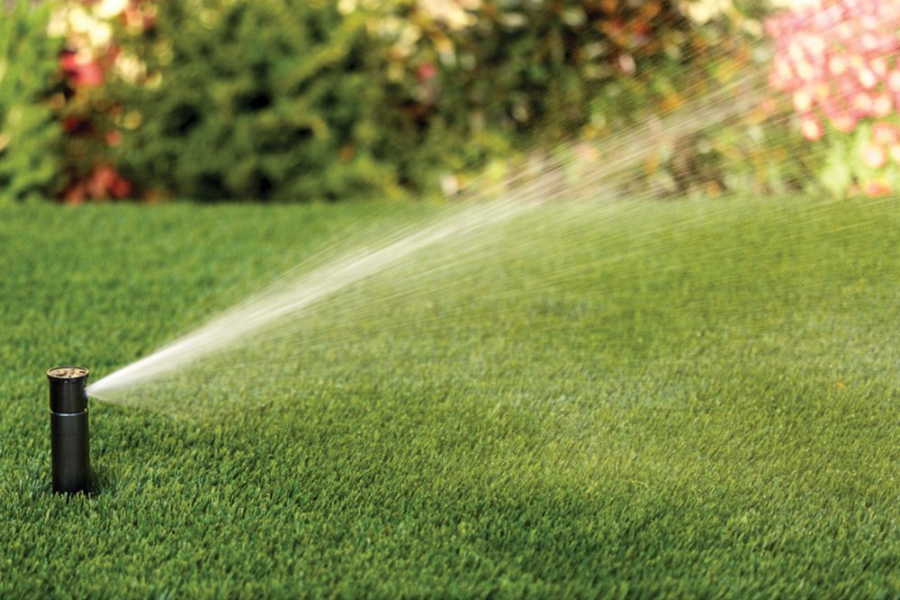Posted On: July 19, 2024
Posted By: KSNM DRIP

Groundnuts, also known as peanuts, are a vital crop across the globe, providing a rich source of protein and healthy fats.� However, cultivating healthy groundnuts requires efficient water management, especially in regions with limited rainfall. This is where KSNM Drip's innovative Rain Hose system comes in � a perfect solution for spray irrigating your groundnut fields.
Ideally, the soil should be a sandy loam or clay loam with a pH ranging from 5.5 to 7.0. Heavy clay soils with poor drainage can restrict root growth and hinder pod development. Likewise, very sandy soils tend to dry out quickly, making it challenging to maintain consistent moisture levels for optimal growth.
Groundnuts are warm-season crops that prefer sunny locations with long growing periods. The ideal temperature for germination is around 27�C (80�F), and optimal plant growth occurs between 20-30�C (68-86�F). Groundnuts are sensitive to frost and will not tolerate cold temperatures.
While groundnuts are drought-tolerant to some extent, they require adequate moisture throughout the growing season, particularly during critical stages like flowering and pod formation. The total water requirement for groundnuts can vary depending on climate, soil type, and variety, but generally falls within the range of 550-650 millimeters (21.7-25.6 inches) of water. Well-distributed rainfall patterns are ideal, but irrigation may be necessary during dry periods to supplement moisture needs and ensure optimal yields.
The planting window for groundnuts depends on local climatic conditions. In tropical regions, groundnuts can be planted year-round, while in temperate zones, planting typically occurs in the spring or early summer after the danger of frost has passed.
Crop Rotation: Practicing good crop rotation is essential for maintaining soil health and preventing pest and disease buildup. Groundnuts are a good rotational crop for other legumes, cereals, and cotton.
By understanding these essential factors � soil type, climate, water needs, and planting considerations � farmers can create optimal growing conditions for their groundnut crops, paving the way for a successful and profitable harvest.
Absolutely! Rain Hose is ideally suited for spray irrigation in groundnut farming. Here's why:
Rain Hose features tiny emitters throughout its length, ensuring a gentle, even spray of water across your entire groundnut field. This eliminates the risk of dry patches or waterlogging, promoting consistent growth and yield.
Compared to traditional flood irrigation methods, spray irrigation with Rain Hose significantly reduces water wastage. This translates to lower operational costs and a more sustainable farming practice.
The gentle spray from Rain Hose helps create optimal moisture conditions for groundnut seed germination. This leads to a higher germination rate and a stronger foundation for your crop.
Unlike flood irrigation, spray irrigation minimizes water contact with the groundnut foliage. This helps prevent the spread of fungal diseases that thrive in humid conditions.
The benefits of using spray irrigation for groundnut cultivation extend far beyond water conservation. Here are some compelling reasons to make the switch:
Studies have shown that spray irrigation can lead to yield increases of up to 20-30% in groundnut crops compared to flood irrigation methods. This translates to significant economic gains for farmers.
Spray irrigation promotes even nut development and reduces the risk of hollow or misshapen nuts, leading to a higher quality harvest.
Traditional flood irrigation methods can encourage weed growth. Spray irrigation, on the other hand, delivers water directly to the groundnut plants, minimizing weed germination and growth.
Spray irrigation helps maintain a healthy soil structure by preventing soil erosion that can occur with flood irrigation. This, in turn, improves long-term crop productivity.
Look no further than KSNM Drip! We are a leading provider of top-quality drip and spray irrigation systems, including the innovative Rain Hose. Our Rain Hose is specifically designed to meet the unique needs of groundnut cultivation, ensuring optimal water delivery and promoting healthy crop growth.
Installing Rain Hose for your groundnut fields is a relatively simple process. Here's a basic overview:
Field Preparation: Ensure your field is properly levelled for even water distribution.
Layout Planning: Design the Rain Hose layout based on your field size and groundnut planting pattern. KSNM Drip can provide expert guidance on this aspect.
Rain Hose Installation: Lay the Rain Hose along the designated paths within your field. KSNM Rain Hose comes in various lengths to suit your specific requirements.
Connection: Connect the Rain Hose to your water source using the appropriate fittings provided by KSNM Drip.
System Testing: Once everything is in place, perform a test run to ensure proper water flow and pressure throughout the Rain Hose system.
Growing healthy and profitable groundnut crops requires efficient water management strategies. KSNM Drip's Rain Hose, combined with the advantages of spray irrigation, offers a winning solution for farmers. With its uniform water distribution, reduced water wastage, and disease prevention benefits, Rain Hose promotes optimal groundnut growth and maximizes your yield potential.
Make the smart choice for your groundnut farming � choose KSNM Rain Hose! Contact us today to learn more about this innovative irrigation solution and unlock a world of benefits for your crops.